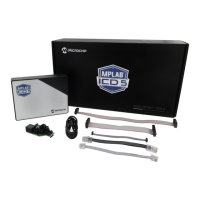Troubleshoong First Steps
User Guide
© 2023 Microchip Technology Inc. and its subsidiaries
DS-50003529B - 61
6. Troubleshoong First Steps
If you are experiencing problems with MPLAB ICD 5 In-Circuit Debugger operation, the following
sections are provided to help.
6.1 Some Quesons to Answer First
1. What device are you working with? Often an upgrade to a newer pack (DFP/TP) version for
MPLAB X IDE is required to support newer devices.
2. Are you using a Microchip demo board or one of your own design? Have you followed
the guidelines for resistors/capacitors for communications connections? See 3.3. Target
Connections.
3. Have you powered the target? For details see 10.2. Power Specications.
4. Are you using a USB hub in your setup? Is it powered? Some hubs may have compatibility
issues with MPLAB tools. If you continue to have problems, try using the debugger without the
hub (plugged directly into the PC).
5. Are you using a communication cable shipped with debugger? If you are using a longer
cable, it may have communications errors. If a longer cable is required, consider another type of
communication. See 3.2. PC Connections.
6. Are you using the USB cable shipped with the debugger? Other USB cables may be of poor
quality, too long or do not support USB communication.
6.2 Top Reasons Why You Can't Debug
1. Oscillator not working. Check your Conguration bits setting for the oscillator. If you are using
an external oscillator, try using an internal oscillator then retry debugging. If you are using an
internal PLL, make sure your PLL settings are correct.
2. No power to the target board. Check the power cable connection to the target or the debugger
if powered by the debugger.
3. Incorrect VDD voltage. The VDD voltage is outside the specications for this device. See the
device programming specication for details.
4. Physical disconnect. The debugger has become physically disconnected from the computer
and/or the target board. Check the communications cables’ connections.
5. Communications lost. The PC to debugger communication has somehow been interrupted.
Reconnect to the debugger in MPLAB X IDE.
6. Device not seated. The device is not properly seated on the target board. If the debugger is
properly connected and the target board is powered, but the device is absent or not plugged in
completely, you may receive the message:
Target Device ID (0x0) does not match expected Device ID (0x%x)
, where %x is the expected device ID.
7. Device is code-protected. Check your Conguration bits settings for code protection.
8. No device debug circuitry. The production device may not have debugging capabilities. Use a
Processor Extension Pak (DS50001292) or Debugger Extension Pak (DS50002243) as required.
9. Application code corrupted. The target application has become corrupted or contains errors.
Try rebuilding and reprogramming the target application. Then initiate a Power-On-Reset of the
target.
10. Incorrect programming pins. The PGC/PGD pin pairs are not correctly programmed in your
Conguration bits (for devices with multiple PGC/PGD pin pairs).
11. Additional setup required. Other conguration settings are interfering with debugging. Any
conguration setting that would prevent the target from executing code will also prevent the
debugger from putting the code into Debug mode.

